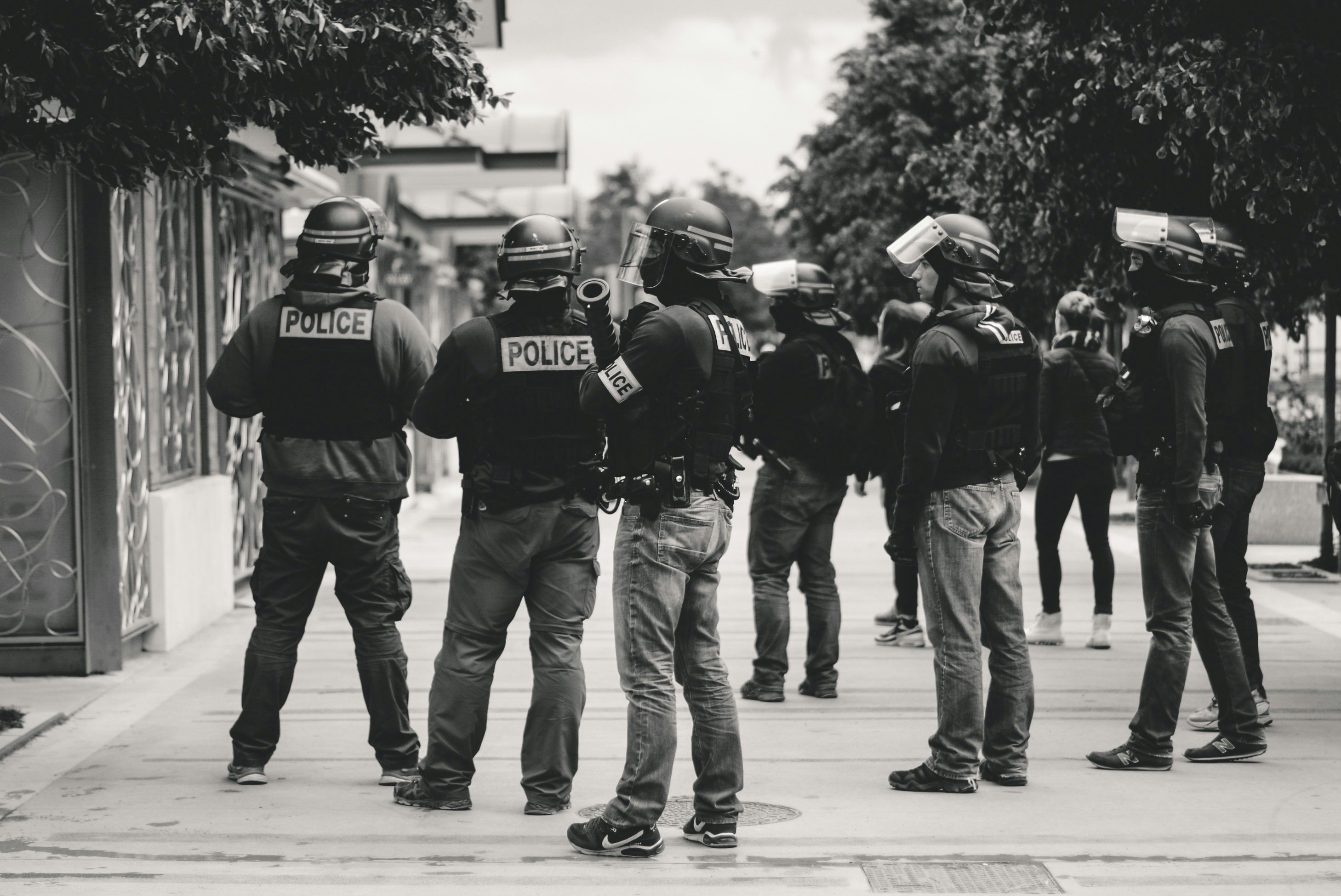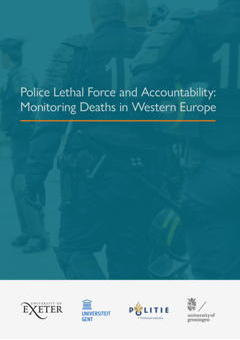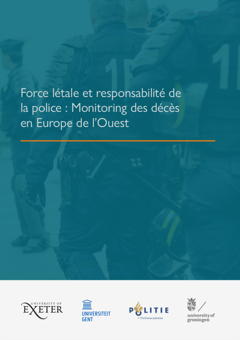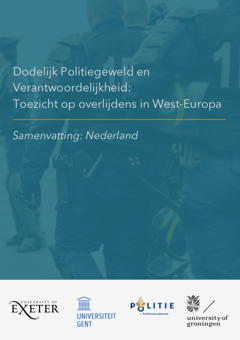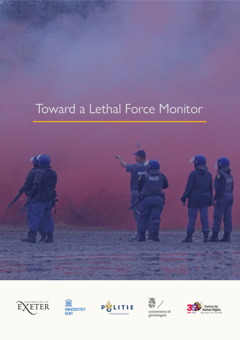Launch event
There is a one-hour video registration of the launch event, chaired by Stephen Skinner, going over the critical considerations of this website and ending in a Question & Answer session. Speakers are:
- 00:00-00:05 – Chair & Introductions: Stephen Skinner
- 00:05-00:10 – Background to LFM and website: Brian Rappert
- 00:10-00:15 – Regional summary of Latin America: Ignacio Kano
- 00:15-00:20 – Regional summary of Europe: Abi Dymond
- 00:25-00:30 – Regional summary of Caribbean: Tarik Weeks
- 00:30-00:35 – What we do not yet know: Thomas Probert
- 00:35-00:40 – Why we do not know it: Joel Ariate
- 00:40-01:00 – Q&A: chaired by Stephen Skinner
Stephen Skinner (2024)
Enhancing State Accountability for Police Use of Lethal Force: Global Monitoring and Comparative Benchmarking
Policing: A Journal of Policy and Practice 18. Doi: https://doi.org/10.1093/police/paad100.
Policing and law enforcement bodies and the public authorities that govern them should be accountable for all deaths connected with a use of force. Accountability is a requirement of international human rights law and related provisions on the use of force, and foundational to legitimate, constrained, and consensual policing in liberal democracies. However, divergence in normative compliance and types of state system means that accountability for lethal force is inconsistent around the world. This paper discusses how a global system for monitoring lethal force could enhance accountability by making effective use of comparative benchmarking.
Brian Rappert, Otto Adang, Jasper de Paepe, Abi Dymond, Marleen Easton, Thomas Probert (2022)
A Global Lethal Force Monitor: Comparative Opportunities and Challenges
Homicide studies 27:1. Doi: https://doi.org/10.1177/10887679221121146.
Comparison across jurisdictions is one way of assessing the appropriateness of lethal force resulting from the actions of law enforcement agencies. This article sets out a vision for a global use of force monitor that can enable meaningful comparisons between law enforcement agencies. It examines some of the opportunities and challenges associated with developing such a monitor in relation to (i) the legal frameworks in place governing use of lethal force; (ii) how official state agencies record and respond to deaths; and (iii) the contexts for the use of lethal force.
Ignacio Cano (2021)
The Use of Lethal Force by the Police in Kenya
African Policing Civilian Oversight Forum (APCOF). ISBN 978-1-928332-98-5. Download: PDF (2MB)
Excessive use of lethal force is a contributing factor in undermining the legitimacy of the police. This report uses a set of indicators through which the use of lethal force by the state can be measured to better understand the patterns and risks of use of force in Kenya. It was the second in what we hope will be a series of studies on use of force in Africa.
Ignacio Cano (2021)
The Use of Lethal Force by the Police in South Africa
African Policing Civilian Oversight Forum (APCOF). ISBN 978-1-928332-75-6. Download: PDF (2MB)
Excessive use of lethal force is a contributing factor in undermining the legitimacy of the police. This report uses a set of indicators through which the use of lethal force by the state can be measured to better understand the patterns and risks of use of force in South Africa. It was the first in what we hope will be a series of studies on use of force in Africa.
Brian Rappert, Otto Adang, Aline Daillère, Jasper De Paepe, Abi Dymond, Marleen Easton, Stephen Skinner (2021)
Police Lethal Force and Accountability (2021)
You can download the full report as PDF below here, in English or in French; alternatively there is also a Dutch summary available:
Police Lethal Force and Accountability: Monitoring Deaths in Western Europe was launched on Thursday 11th February 2021. The video here includes the presentations given as part of that launch.
Police Lethal Force and Accountability: Monitoring Deaths in Western Europe can be summarized as follows:
The use of force by the police and other law enforcement officers has long been a significant topic of concern, especially when it results in death. This issue and the controversies around it have recently been highlighted by a series of high profile deaths in 2020.
Police Lethal Force and Accountability assesses the frequency of deaths, and the availability and reliability of information regarding deaths, associated with the application of force by law enforcement agencies in four jurisdictions: Belgium, England & Wales, France and the Netherlands.
As documented, while deaths from the use of force appear relatively rare across these four jurisdictions when compared to countries such as the US, the procedures and policies for recording, investigating and disclosing details associated with deaths are wanting. The availability of official information on the number of deaths associated with the use of force, its reliability, and the extent of details collected on those who die at the hands of the state vary from country to country. While there are elements of good practice, the procedures and policies are often lacking in critical respects. As a result of such deficiencies, it is difficult to assess many important dimensions of policing; including whether some communities are disproportionality subjected to the lethal use of force.
Ultimately, reducing the extent of police force requires addressing underlying societal conditions associated with employment, health, housing and education. However, more can be done by law enforcement agencies, as well as by their oversight bodies and government ministers. Assembling data and evidence that is accessible, relevant and useful to those concerned with lethal force is a necessary step to enhance accountability for, and thereby possibly prevent, deaths. Police-related bodies not only need to act on what they know but, to demonstrate they are doing so, to the populations they are meant to serve. Every death associated with the use of force by law enforcement officials should be recorded, recognised and investigated. No one’s death should go unacknowledged and unexamined.
In this spirit, the overall conclusion of Police Lethal Force and Accountability is as follows:
Policing agencies considered in Belgium, England & Wales, France and the Netherlands, all need to enhance data collection, publication and analysis of deaths following the use of force in their respective systems. Further, they need to act upon lessons from previous experiences, so as to help prevent future deaths and ensure different communities are not disproportionality subjected to the lethal use of force.
Dumisani Gandhi, Christof Heyns, Stuart Maslen, Beryl Orao, Iruebafa Lily Oyakhirome, Thomas Probert, Otto Adang, Jasper De Paepe, Abi Dymond, Brian Rappert, Stephen Skinner (2021)
Toward a Lethal Force Monitor
The full report is available for download as PDF, in English only.
Toward a Lethal Force Monitor was launched on Wednesday 7th July 2021. You can listen (46min) to the audio or watch the video of the presentations given as part of the launch.
The report can be summarized as follows:
Toward a Lethal Force Monitor assesses the existing procedures and policies for recording, investigating and disclosing information on deaths associated with the application of force by law enforcement officers in Kenya and South Africa. While policing agencies in these countries are overseen by authorities that strive to be an effective check against police impunity, in both concerns can be raised about the public awareness of, access to, and confidence in the information collected on the use of lethal force. Relatedly, evidence that law enforcement agencies analyse information about the use of force in order to identify learning opportunities, or act to revise their policies and practices in light of lessons learnt, is either missing or scant.
Consequently, while Kenya and South Africa have notable police accountability mechanisms in place, both systems still have scope for improvement in making those institutional structures more robust and effective. The country studies of Kenya and South Africa given in this report detailed recommendations for reform.
Toward a Lethal Force Monitor also sets out a future agenda for developing standards for compiling data on the use of lethal force. Currently, a variety of attempts are underway in different countries to monitor police actions. And yet, there are relatively few efforts to assess practices across countries. This report concludes by specifying some of the principles that could underpin the methodology for a comprehensive international Lethal Force Monitor.
